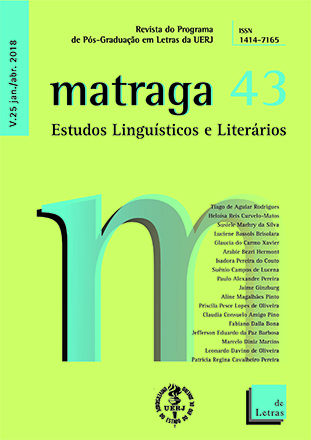The theological antinomism in ‘The castle’ of Franz Kafka and its relationship with the heretical Kabbalah
DOI:
https://doi.org/10.12957/matraga.2018.32649Keywords:
Tradition. Interpretation. Heretical Kabbalah. Literature. Franz Kafka.Abstract
The purpose of this paper is to identify and reflect on Franz Kafka’s The Castle (2010), the intersection between the problem of the crisis of tradition, raised by Walter Benjamin (1987) and Gershom Scholem (1999), and its development in the dialectic of the Jewish mysticism, especially in the antinomian movements that emerged from heretical Kabbalah and constituted Messianic nihilism. The journey of the character of The Castle, rather than intriguing peripécies, develops, in a parody, an exegetical exercise proper to the Jewish tradition (BLANCHOT, 2002). The Castle, an object devoid of substance, surrounds itself with infinite comments, forming a veritable labyrinth of words. Only in his commentaries, the Castle resembles the Name of God speculated by the Jewish Kabbalists. For heretical Kabbalah, God is inseparable from his revealed word, the Torah, so that his Name is infinitely interpretable. We intend to demonstrate that the relationship between the characters and the comments about the Castle, twisted and desecrated as the Name of God among the Kabbalists, makes Kafka a writer who masterfully explored the boundaries between religion and nihilism.
Downloads
Downloads
Published
How to Cite
Issue
Section
License
Authorization
Matraga – Scientific Journal of the Post-graduate Program in Arts and Humanities of UERJ is authorized to publish the article submitted here, if it is accepted for online publication. It is attested that the contribution is original, that it is not being submitted to another publisher for publication, and that this statement is the expression of truth.
The works published in Matraga's virtual space – Scientific Journal of the Post-graduate Program in Arts and Humanities of UERJ will be automatically transferred, and your copyright is reserved to Matraga. Its reproduction, in whole or in part, is conditional on the citation of the authors and the data of the publication.

Matraga uses license Creative Commons - Attribution-Non-Commercial 4.0 International.





